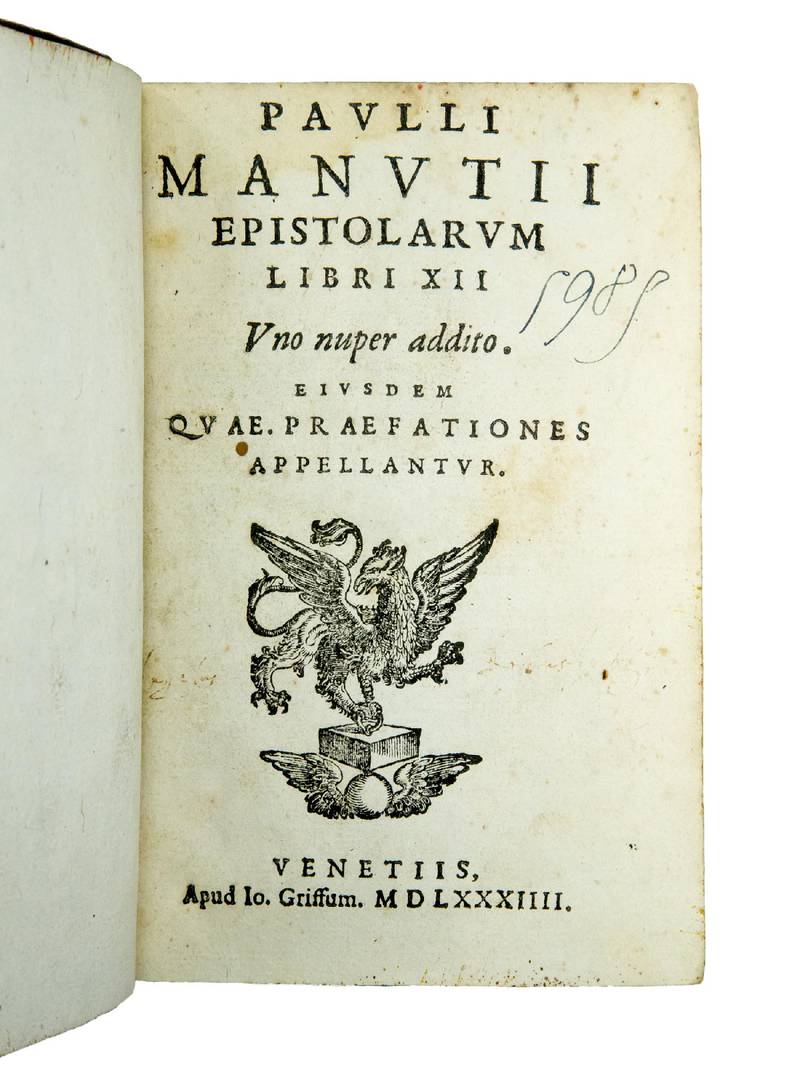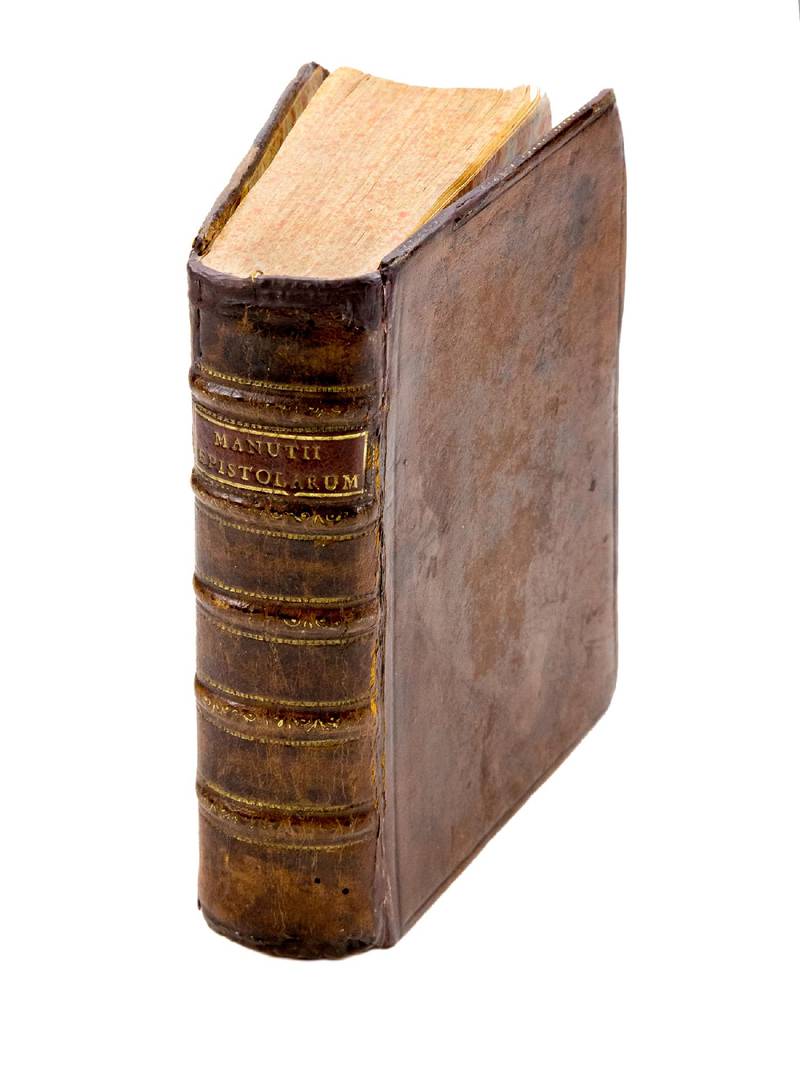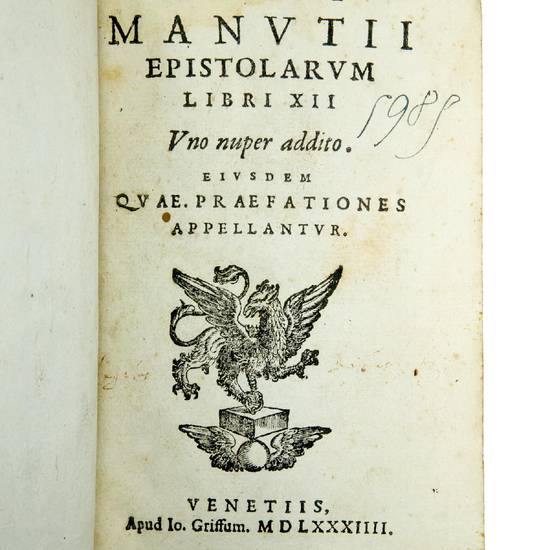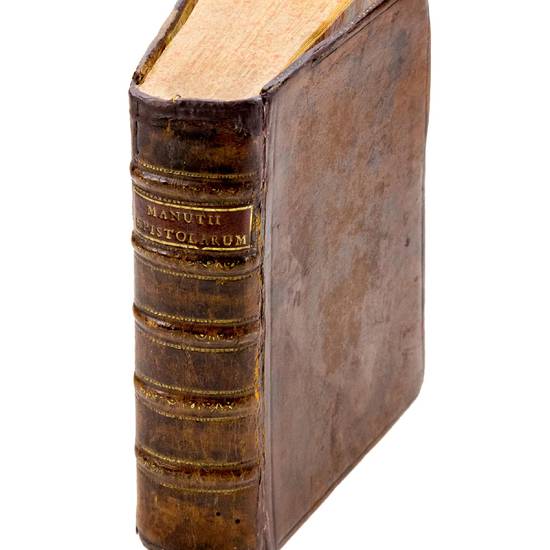8vo. (16), 536, (2), 128, (6) pp. a8, A-Z8, Aa-Tt8. With the printer's device on the title-page. Early eighteenth century calf, gilt spine with red morocco label, marbled endpapers, sprinkled edges. Old entry of ownership on the front fly-leaf: “Odoardo Vercelli”.
Edit 16, CNCE 35382.
AFTER Aldus the Younger's printing of 1580, Paolo Manuzio's letters were soon afterwards printed in various European cities, but in Italy the work was reprinted only six times until the end of the century. The first was Girolamo Polo in Venice in 1582 (and again in 1588). He was followed at Venice again by Giovanni Griffio in 1584, then by Tarino at Turin in 1587 and in 1595 by Farri at Venice. All these editions are mostly page by page reprints of the 1580 edition, with the exception of that edited by Enrico Farnese printed at Pavia by Viani in 1589.
Paolo was the youngest son of Aldo Manuzio the Elder. He had the misfortune to lose his father at the age of two. After this event his grandfather and two uncles, the three Asolani, carried on the Aldine Press, while Paolo prosecuted his early studies at Venice. Excessive application hurt his health, which remained weak during the rest of his life. At the age of twenty-one he had acquired a solid reputation for scholarship and learning.
In 1533 Paolo undertook the conduct of his father's business, which has latterly been much neglected by his uncles. Paolo determined to restore the glories of the house, and in 1540 he separated from his uncles. The field of Greek literature having been well night exhausted, he devoted himself principally to the Latin classics. He was a passionate Ciceronian, and perhaps his chief contributions to scholarship are the corrected editions of Cicero's letters and orations, his own epistles in a Ciceronian style, and his Latin version of Demosthenes. Throughout his life he combined the occupations of a scholar and a printer, winning an even higher celebrity in the former field than his father had done. Four treatises from his pen on Roman antiquities deserve to be commemorated for their erudition no less than for the elegance of their Latinity.
Several Italian cities contended for the possession of so rare a man. He also received tempting offers from the Spanish court. Although his publications were highly esteemed, their sale was slow. Thus his life was a permanent struggle with pecuniary difficulties. In 1556 he received for a time external support from the Accademia Veneta, founded by Federico Badoer, who failed disgracefully in 1559, and the academy was extinct in 1562. Meanwhile Paolo had established his brother Antonio, a man of good parts but indifferent conduct, in a printing office and book shop at Bologna. Antonio died in 1559, having been a source of trouble and expense to Paolo during the last four years of his life. Other pecuniary embarrassment arose from a contract for supplying fish to Venice, into which Paolo had somewhat strangely entered with the government.
In 1561 Pius IV invited him to Rome, offering him a yearly stipend of 500 ducats, and undertaking to establish and maintain his press there. The profits were to be divided between Paolo Manuzio and the Apostolic Camera. Paolo accepted the invitation, and spent the larger portion of his life, under three papacies, with various fortunes in the city of Rome. The works published by the Stamperia del Popolo Romano were mostly Latin works of theology and Biblical or patristic literature. Meanwhile his eldest son, the younger Aldo, had succeeded him in the management of the Venetian printing house. Overtaxed with studies and commercial worries Paolo died at Rome in his sixty-second year (cf. T. Sterza, Paolo Manuzio editore a Venezia (1533-1561), in: “ACME. Annali della Facoltà di lettere e filosofia dell'Università degli studi di Milano”, 61/2, 2008, pp. 123-168; and F. Barberi, Paolo Manuzio e la stamperia del popolo romano (1561-1570): con documenti inediti, Roma, 1942, passim).
[9162]





